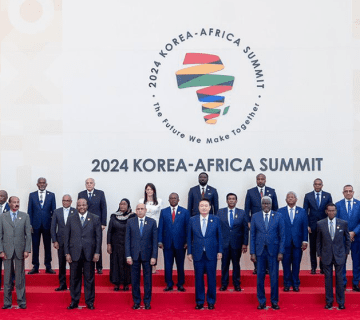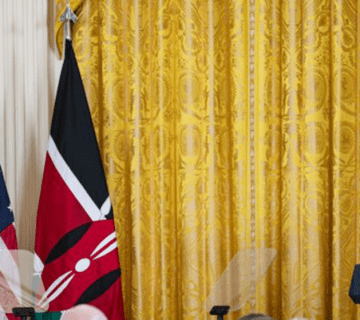On May 11, 2023, nearly a month after the armed conflict broke out in Sudan between Rapid Support Forces (RSF) and Sudan Armed Forces (RAF), the warring factions signed a Declaration of Commitment to Protect Civilians in Jeddah, Saudi Arabia. The declaration was aimed at facilitating humanitarian assistance and de-escalation as well as set out confidence building measures towards permanent ceasefire. However, the delicate declaration froze with the escalations on the ground. The conflict has now displaced about 6 million people internally, killed 10,000 and displaced over 1 million as refugees in neighbouring Ethiopia, South Sudan and Chad. As the humanitarian situation in Sudan significantly worsens, all hope turns to Saudi Arabia with Jeddah rising as the ‘City of Peace’ in the Gulf, Red Sea and Horn of Africa (GRHOA). Why would Saudi Arabia hold the balance in this region?
The Backyard of an Emerging Power?
Saudi Arabia is undoubtedly an emerging global power and contender for regional anchor status. Saudi Arabia is the 18th largest economy in the world, the largest oil producer in the Middle East hence as a rising global trading power with interests in maritime security. Besides its global economic power, Saudi Arabia sits at the centre of the leadership of the Muslim and Arab worlds; it is the custodian Islam’s two holiest shrines or mosques. The Horn of Africa and the Red Sea region thus lie in Saudi’s immediate geo-strategic environment inter-connected through historical and cultural ties. The Red Sea moves about 15 percent of sea trade and more so energy products hence the interest in the security of the sea trade route and the region’s elevation as Saudi Arabia’s sphere of influence.
Saudi’s Expanding Role in Peace and Security in the Horn of Africa
The complex geopolitical environment in GRHOA region fundamentally risks the security of Saudi Arabia’s Western Security flank. Regional conflicts in Somalia, Ethiopia, and Sudan as well as dangerous disputes such as the Egypt-Ethiopia-Sudan dispute over the River Nile and the Grand Ethiopian Renaissance Dam (GERD) which have always played into the geopolitical competition and rivalry have elevated the risk. The long spate of violent extremism and terrorism across GRHOA especially in Somalia where al Shabaab, the region’s major terror group with strategic partnership with the global al Qaeda network operates. Piracy off the Somali Coast threatens the global sea trade and shipping business with losses of USD 18 billion annually. The entrance of Iran-backed Houthi rebels further threatens Saudi’s security and strategic interests. In fact, in March 2022 Houthis bombed two major Saudi oil facilities in the cities of Jeddah and Riyadh. The attacks cut Saudi’s oil production capacity by 5.7 million barrels per day, and global oil supply by 5%. As such, Saudi Arabia’s interests are more secure with itself playing a critical stabilizing role.
Saudi Arabia has thus re-jigged the geopolitics of the GRHOA through détente with rivals Qatar and Iran, and conflict prevention in its “backyard”, with Jeddah as the crucible of Saudi’s peace diplomacy. In the Horn of Africa, Saudi drove the Eritrea-Ethiopia Peace Agreement in July 2018 which brought a rapprochement which led to the Tripartite Cooperation Framework between Ethiopia, Eritrea and Somalia in September of the same; regional peace and security was the priority of the two agreements. The wider rapprochement contributed to the lifting of international sanctions on Eritrea in November 2018. Saudi Arabia has also been a critical partner alongside other international partners in Somalia’s security sector, in tandem with Somali Transition Plan of post-African Union Mission in Somalia (AMISOM) peacekeeping.
Economic Recipe of Saudi Arabia’s Peace
Saudi Arabia has leveraged on the peace and security efforts in the Horn of Africa, to further deepen economic ties in the region as part of its strategy for the region’s stability through job creation, poverty eradication, basic services delivery, and infrastructure development. Ethiopia, Somalia and Sudan which are conflict-prone, have been the largest recipients of Saudi Arabia’s foreign direct investment and bilateral aid. Having invested USD 35.7 billion in Sudan in the last two decades, with USD 15 billion worth of projects ongoing, and USD 25 billion in Ethiopia between 2014 – 2018, combined with robust diplomatic interventions, Saudi Arabia aims to achieve the most significant stabilizing impact in the region yet. In the recent Saudi – Africa Summit Saudi Arabia committed USD 533 million to Africa, with more prospects for investments from the USD 700 billion Saudi Public Investment Fund.
The Prospects in Jeddah
The resumption of the peace talks in Jeddah in October is uniquely important because Sudan’s peace process has been fundamentally flawed with a multiplicity of peace actors and processes, incoherence, fragmented approaches, exclusion of civilians and inadequate leverage. The peace processes have been separately led by the African Union (AU), the Intergovernmental Authority on Development (IGAD), the Troika (US, Britain and Norway), and Egypt which has in turn inspired forum shopping by conflict actors and disincentivized commitment to peace process.
However, the Jeddah talks hold the most critical, promising and needed opportunity given the diplomatic repertoire of the mediating parties (Saudi Arabia and the US) and their levels of leverage on the conflict actors. Jeddah has also adopted a unified approach, maintained the African input with the central participation of IGAD, and ensured inclusion of civilians. The Jeddah talks are focused on achieving a ceasefire, humanitarian access and a comprehensive peace process. It is the practical testimony of Saudi Arabia’s quest for peace and stability in the Horn of Africa region.
Saudi Foreign Minister, Prince Faisal bin Farhan bin Abdullah Al-Saud and representatives of the Sudanese army and rival paramilitary Rapid Support Forces along with other officials pose for a group photos after signing an agreement for a seven-day ceasefire in Jeddah, Saudi Arabia, May 20, 2023. Saudi Press Agency/Handout via REUTERS
The views expressed in this article are those of the authors and they do not necessarily reflect the position of the HORN Institute.



